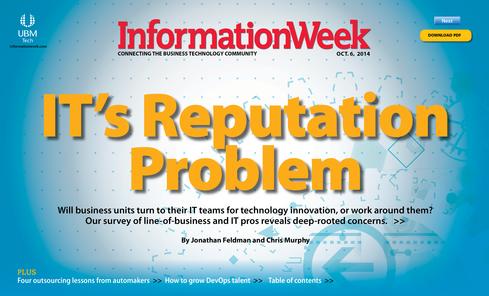IT Has A Reputation Problem
Can IT teams deliver the innovation companies need? Our IT Perception Survey reveals many doubters.

 Download the entire new issue of InformationWeek Tech Digest, distributed in an all-digital format.
Download the entire new issue of InformationWeek Tech Digest, distributed in an all-digital format.
A key, though unsurprising, finding of this year's InformationWeek IT Perception Survey is that IT pros think more highly of their importance and performance than non-IT pros do. But that gap is closing compared with the findings of our survey two years ago. In 2012, 60% of the IT pros who responded to our survey said that IT was integral to the business, but only 43% of line-of-business respondents agreed -- an embarrassingly large 17-point gap. Fast-forward to this year's survey, in which 70% of IT respondents and 60% of LOB respondents say IT is integral. We must be doing something better.
Among the other key findings of our IT Perception Survey of 330 IT and non-IT pros:
IT's role in innovation isn't so clear. The gap between IT and LOB perceptions extends to IT's importance in creating business innovation. This year, 44% of IT pros say they are "extremely" important, compared with only 33% of non-IT. And that's a slightly bigger gap than in the previous survey.
Here's what I think creates that gap: IT isn't working enough on stuff that would actually benefit lines of business; instead, it's working on what it thinks will benefit those groups. In our survey two years ago, we called this a lack of "integration" with business units: How synced up is IT with business units versus being off on its own building systems that nobody really wants?
IT and non-IT agree: The opposite of integration? We define that as siloed. We asked about IT integration by business function, and it varies. Marketing, sales, and HR appear to be least integrated with IT; operations, customer service, and finance the most integrated. Non-IT pros consistently see less integration than IT does. The silo stats indicate a huge problem. IT can have a gigantic impact on a business unit's effectiveness, profitability, and agility, so it's insanity for there not to be cross-departmental collaboration.
[Here's how 3 companies' IT teams used digital initiatives effectively. Read How IT Can Spur Digital Innovation.]
The solution has much more to do with IT behavior than resources or who controls tech spending. It doesn't take a lot of people and money to build relationships with other business units. It requires IT pros to ask probing questions about how they can help improve business results. It requires IT to know and share best practices. It requires IT pros to advise other business units on emerging digital business strategies (and vice versa). It requires IT pros to network with their peers at similar companies to tap new ideas about how to improve their own business. The impact IT can have here, and the gratitude and reputation boost that IT can earn, can't be overstated.
Even in tech projects, IT involvement isn't a given. Seventy-two percent of IT pros in our survey agree that IT should work closely with business execs to develop innovative apps; 20% agree somewhat. Among non-IT respondents, only 54% agree, while 29% agree somewhat and 17% are neutral or disagree. And this question suggests only that business execs "should" work closely with IT on innovation. That's not the same as "will." We need to get to "will." And we need to win more business leaders over to completely agree with the notion that IT input is indispensable to innovation.
What's keeping this version of "will" power from happening? Two things are going on. First, IT pros tend to be too comfortable wrenching on technology, keeping them from reaching out to others. Second, and more concerning, IT has lost credibility. Credibility is the coin of relationships and, like it or not, relationships are about perception.
IT's reputation is built on delivering what business colleagues actually need and dealing with them effectively when their wants aren't really needs. IT organizations need a strategy to deal with demands for emerging technologies, or they'll be perceived as naysayers. As one LOB product specialist told us: "IT processes add costs and restrict innovation by only accepting established technology." Learn to compromise. If you can't use a new technology because your team lacks the skills, consider enlisting a third party while staffers get up to speed. A big fat "no" is going to cost you reputation coin.
One tactic that works for my team is to stop saying "No, but ..." and start saying "Yes, and ..." In other words: "Yes, we can do that, and now we have to talk about the time frame. To do that on the schedule you want will take additional resources. Or we could do it on a longer time frame." Offer choice and you offer flexibility. Perception is reality. Of course, IT must then deliver.
Consider surveying your company's perception of IT and sharing those results with the IT organization, even integrating them into performance coaching. Use our survey questions, and benchmark against our findings. Keeping score and tracking progress can be a powerful motivator, but proceed with caution: If you start to reward and punish based on perception metrics, expect IT staffers to ask their friends elsewhere in the company to mail bomb the CIO with insincere "happy customer" notes.
Meantime, some highly technical staffers will struggle with this approach. But it's time for them to move on. If your social contract with employees doesn't include excellent customer service, it's time to reset expectations. You will lose some people, but some will perk up and take pride in being helpful. The ones you lose will make your IT organization better.
Read the rest of the story in the new issue of
InformationWeek Tech Digest.
About the Author
You May Also Like






